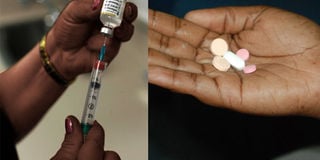Are injections more effective than tablets?

There is a common belief among many people that injections are more effective than tablets. In fact, some patients will claim that they have not been treated if they are not given injections. These patients probably think that since injections are more painful then it means that they are more effective. However, the pain experienced by injections such as quinine is as a result of their high acidity or alkalinity and not due to their effectiveness.
In order to understand best whether injections are more effective than tablets, it is paramount to address the reasons why certain medications are in form of injections while others are in tablet form.
There are certain drugs which if given as tablets would be completely ineffective since they would be destroyed by the enzymes that digest food in the stomach. A good example is the insulin injection used in the treatment of diabetes. Insulin is a protein and therefore if given as tablet it would be digested by the same enzymes that digest meat (a protein) in the stomach. For this reason you will never come across insulin tablets.
Similarly, certain drugs are also ineffective if given in an injection form except when given as tablets. This is because some drugs are only effective when in a solid form. Once formulated into an injectable liquid, they easily break down and lose their medicinal properties. To understand this better, let’s use an illustration of powdered milk. Powdered milk in solid form can last years, even without refrigeration while liquid milk may not last for three days in the open.
To address this instability issue, some injections come as powders which have to be mixed with water just before administering. However, this requires the drug to be able to dissolve in water hence leaving out the insoluble drugs. Many ARVs and painkillers such as aspirin are present in tablet forms and few have the injectable option.
Another reason for having medication in the injection form is because it may be impossible for certain patients to take tablets. These include patients who are vomiting, unconscious or for one reason or another are not able to take anything by mouth e.g. if they have a cancer lining the upper part of their alimentary canal. Hence you will find an injection alternative for almost every medication that is given by mouth and not because they are more effective.
In certain instances such as in an emergency, a medical practitioner may want to achieve an effect almost immediately, for example when a patient is bleeding and they want to stop it as soon as possible. In such instances, an injection may be preffered since it gets absorbed into the blood directly as opposed to a tablet which must first be dissolved in the stomach before getting absorbed into the bloodstream.
It is also important to note that presentation of a drug in the form of a tablet, injection or even cream may depend on the type of disease that it is designed to treat. Presence of hookworms in the stomach necessitates the use of tablets. The same also applies to a skin condition which would require a cream or ointment to be superficially applied on it unless the disease causing micro organism has entered the blood.
In addition, drugs that have both a tablet and an injection form are normally designed during the research and clinical trials in such a way that the same amount of the drug enters the blood irrespective of the route of its administration. This means that the effectiveness of both the injection and the tablet in treating a particular condition shall be the same. In fact, in some cases, the tablet may have a higher dose than the injection to compensate for the amount that will not be absorbed from the stomach such that in the end, its amount in the blood will still be equivalent to the one in the injection form.
Another common belief that many use to justify injections as superior is that all drugs work when in the blood. This is not always the case. Where a drug acts depends on where in the body the medical condition lies such as in the brain, heart, liver, kidney etc and therefore having the injection to get the drug into the blood only offers a time advantage and not an effectiveness goal. Generally, tablets are much safer compared to injections. This is because an injection like quinine if not properly administered can result in paralysis leading to lameness. Use of injection or tablets hence depends on the disease or condition and the situation at hand. Therefore,the next time the doctor doesn’t give you an injection, don’t think he hasn’t treated you or your relative. He has simply selected the best medication to manage your condition.
The writer is a pharmacist with Quality Chemical Industries Limited




